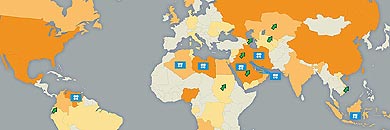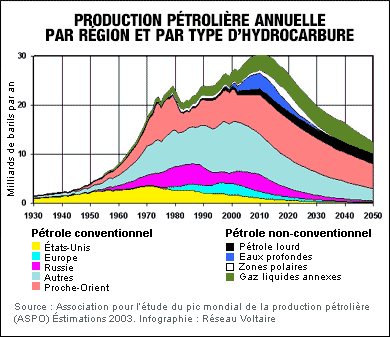Oilfields will not last forever. Some States are progressively losing the gift of Mother Nature. Others, especially in the Middle East, still hope to produce oil for some years at low prices. The constant increase of demand and decrease of supply in the foreseeable medium term worry the U.S. which is the main consuming country of the world. Economists of all tendencies demand a regulation on the access to world energy for predatory wars will increase, as the Iraqi invasion.

Oil prices have constantly increased since September 11, 2001, date in which the new American regime was established. The prices have doubled in the last two and a half years. Such increase is due to speculative fluctuations in the markets which take into account the “risk factor” in a very short term. It has been ignored; however, the geological limitations and increasing energy needs whose effects will be only felt in the medium or long terms. Since April 2004, the rise in the prices has accelerated so quickly that a barrel is traded at $50. Speculators expect an imminent military reaction of the Bush administration: it could be either an attack attributed to intangible Islamists followed by a coup against the Saudi monarchy [1] or a conventional attack against Syria [2].
In the medium term, the increasing energy demand at world level, especially attributable to the structure of the American economy and the rapid industrial development of India and China, will have to deal with the decrease of the world oil supply in a few years. There will also be an important price rise for oil production in other oilfields and it will be more difficult and expensive. But, according to all available projections, the major producing oilfields will be in the Middle East. Therefore, it is imperative for the Bush-Cheney oil venture to make this strategic region to go through a period of instability or even chaos in order to have its full control.
On March 31, 2004, Yves Cochet warned French leaders about the declining of the “conventional oil” [3] production in an open forum published on the French journal Le Monde [4]. This ecologist representative based his arguments on the works of ASPO’s [5] independent geologists.
In an editorial of the New York Times published on May 7, Paul Krugman recalled that one of the main objectives of the invasion against Iraq was to quickly increase the Iraqi oil production to foster its growth. Mass media mogul and one of the main supporters of the war against Iraq, Ruppert Murdoch, made then an apologia for wars of resources in the following terms: «The best we can get out of this war for the global economy, if such a thing could be said, is a $20 barrel». But, worried, Krugman has noticed that this goal has not been achieved. Saddam Hussein’s withdrawal and the end of the embargo have not been enough to boost the Iraqi production as expected.
The rise of the world prices continued as well as those of gas. On a general basis, Krugman reflected his readers and Americans’ fear: the moment will come in which such a rise will affect the country’s economic model and its way of living. Krugman dismissed the illusory technological solutions to geological difficulties (to drill more oil wells will not stop its decrease) and uneasily concluded: «What we must do is to adapt ourselves». By ending his editorial with such an artistic imprecision, his readers had to choose between accepting the fall (something nobody would do unless forced to) or the military solution. But, regarding the last one, the only solution was to accept Kerry’s strategy [6], for Bush’s only benefited some close companies as Halliburton (it had 80% growth during the first quarter of 2004) without solving the problem. Paradoxically, the former democratic candidate turned out to be Bush senior’s continuator who in 1991 said: «Our way of living is not negotiable».
In the coming years, the Middle East will progressively become the starting point of the exportable oil. In almost all other regions of the world, the production has begun to show an irreversible decline. Therefore, the OPEC (Organization of Petroleum Exporting Countries) will be obviously in a prevailing position if compared to those not included in the organization and it will have an increasing economic and political power as long as the industrial civilization depends on the fossil energy. And this is what the architects of the “Great Middle East” [7] fear and want to avoid through military constraint. The reserves of the Middle East are the key to power in the next decades. This helps to understand the real meaning of the phrase said by George W. Bush after September 11, 2001: «You are with us or against us».
In 2010, the countries of the Persian Gulf will have under their exclusive control more than 60% of the oil world production and, what is more important, 95% of the export capacity at world level. An important part of the other states’ production with large reserves will be absorbed by their own domestic consumption.
By considering economic and geological data, it would then be possible to summarize the neoconservatives’ declaration of war: the Persian Gulf countries, mainly Muslims, will have a significant economic power over the industrialized world, if the military force of the “Judeo-Christian” does not snatch it.
The production of the countries not included in the OPEC has had a general decline which will be exceeded soon by OPEC members, with Saudi Arabia and Iraq as leaders, though the last one could serve the U.S. as a Trojan horse if the occupation continues. It must also be noticed that, to strengthen their increasing economic influence, OPEC member nations, led by Hugo Chávez, are looking at the possibility of using Euros for oil transactions. In this sense, Iraq had already paved the way before the invasion of the “coalition for cheap petroleum” which immediately re-established dollars for oil transactions.

According to this, the “clash of civilizations” will be only a problem of resource distribution; thus, an economic issue. There is no other possible explanation for there is no reason for the Arab world to hate a country which will be forced to become an economic vassal. The rhetoric of the religious and cultural clash is a trick to convince the public opinion to support a conflict whose end will be economically profitable for the one who provoked it.
Click the link above to enlarge the map.
Even inside or related to the oil industry, an increasing number of personalities who do not approve the war of resources, have said they favored detailed and transparent reconsideration of energy provisioning at world level. In fact, many voices have demanded an organization, as independent as possible, to control the distribution of the world energy. Both, the said ecologist Yves Cochet and liberal Matthew Simmons have requested, as many others, a world emergency plan to put an end to the imminent energy crisis [8].
In this critical situation, the free market laws can not be applied and the most powerful become predators to keep their own living standards. This was Bush-Cheney’s perspective [9] , when they opened the road between Afghanistan and Georgia; they tried to overthrow the government of Venezuela and invaded Iraq.
[1] See: «Aucune amitié ne résiste au pétrole», Voltaire, November 21, 2003
[2] See: «La cible syrienne», Voltaire, January 27, 2004
[3] The so called “conventional” oil is the most accessible and easy to exploit; therefore, it is the most profitable. The “non-conventional” oil is the heavy one found in deep or polar waters
[4] See our International Free Forums of April 1, 2004
[5] We also published Controverses. The translation of Mike Ruppert’s report on ASPO Conference held in Paris, May 2003 was made by Arthur Lepic (who went to the Conference) for Red Voltaire, and not by other persons as suggested in previous editions
[6] See our article: «Militarisme: John Kerry dans le texte», Voltaire, March 28, 2004
[7] See: «Bush invente le Grand Moyen-Orient» por Thierry Meyssan, Voltaire, April 22, 2004
[8] “Revealing Statements from a Bush Insider about Peak Oil and Natural Gas Depletion”, from The Wilderness, June 12, 2003
[9] Read Arthur Lepic: «Les ombres du rapport Cheney», Voltaire, March 30, 2004

 Articles by this author
Articles by this author
 Send a message
Send a message










Stay In Touch
Follow us on social networks
Subscribe to weekly newsletter